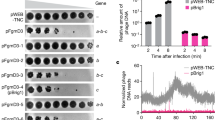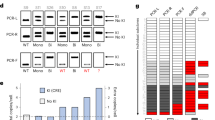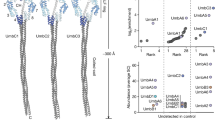Abstract
FOR about twenty years it has been known that the yield of induced mutants has a different type composition in differing mutagenic conditions1. This electiveness of mutagenic action can be either intragenic, intergenie or cell-type specific2. Intragenic electiveness has recently been examined in phage T4 of E. coli especially by Benzer3. This work led to the discovery of sites of high mutability within a gene; the local distribution and the extent of these ‘hot spots’ varies with the mutagenic agent. Since free phage represents extracellular genetic material (DNA) a ‘hot spot’ must be due to the specific nucleotide composition at its site in the DNA which is attacked preferentially by the mutagen. In the case of treatment of cells, mutagenic electiveness could also be an effect of the intracellular environment of the genes but not, or not only, of the DNA-composition differing at different sites within a gene, in different genes or groups of genes. It has been proposed that with forward mutations (for example, auxotrophy) electiveness should not show up as likely as with back-mutations, since the former would be produced by changes at many sites along a gene, while the latter requires a rather specific change at only one or a few points4. No, or only very weak, electiveness should then be expected, especially in forward mutations, if groups of several genes are observed, for example, mutations leading to certain groups of phenotypes.
This is a preview of subscription content, access via your institution
Access options
Subscribe to this journal
Receive 51 print issues and online access
$199.00 per year
only $3.90 per issue
Buy this article
- Purchase on Springer Link
- Instant access to full article PDF
Prices may be subject to local taxes which are calculated during checkout
Similar content being viewed by others
References
Knapp, E., and Kaplan, R. W., Z. Vererbl., 80, 501 (1942); Kaplan, R. W., Naturwiss., 33, 348 (1946); Z. Vererbl., 82, 164 (1943/47); Arch. Mikrobiol., 18, 210 (1953); D'Amato and Gustafsson, A., Hereditas, 34, 181 (1948); Kölmark, G., Hereditas, 34, 270 (1953); Demerec, M., Congr. Inertn. Gent., 1, 201 (1955); Glover, S. W., Carn. Inst. Wash. Publ., 612, 121 (1956).
Kaplan, R. W., in Strahlenbiol., etc., Ergebn., 1952–58, 140 (G. Thieme-Verlag, Stuttgart).
Benzer, S., and Freese, E., Proc. U.S. Nat. Acad. Sci., 44, 112 (1958); Benzer, S., Proc. U.S. Nat. Acad. Sci., 47, 403 (1961).
Westergaard, M., Abh. Deutsch. Akad. Wiss. Berlin, E. Baur-Ged.-Vorlesung I, 121 (1960).
Kaplan, R. W., Winkler, U., and Wolf, H., Nature, 186, 330 (1960).
Winkler, U., Z. Naturforschg., 18b, 118 (1963).
Bautz, E., and Freese, E., Proc. U.S. Nat. Acad. Sci., 46, 1585 (1960).
Lorkiewicz, Z., and Szybalski, W., Biochem. Biophys. Res. Comm., 2, 413 (1960).
De Serres, F. J., and Osterbind, R. S., Genetics, 47, 793 (1962).
Crick, F. H. C., Barnett, L., Brenner, S., and Watts-Tobin, R. J., Nature, 192, 1227 (1961).
Author information
Authors and Affiliations
Rights and permissions
About this article
Cite this article
KAPLAN, R., BECKMANN, H. & RÜGER, W. Different ‘Spectra’ of Mutant Types by Extracellular Treatment of Phage Kappa with Differing Mutagens. Nature 199, 932–933 (1963). https://doi.org/10.1038/199932a0
Issue Date:
DOI: https://doi.org/10.1038/199932a0
This article is cited by
-
Repressor-defekte Mutanten, virulente Mutanten und Adsorptionsresistenz lysogener Zellen beim Phagen ϰ von Serratia
Molecular and General Genetics MGG (1968)
-
Einflu� von Bromuracil auf die Mutationsausl�sung und Inaktivierung durch UV und R�ntgenstrahlen beim Phagen ?
Biophysik (1968)
-
Photodynamische Mutationsauslösung und Inaktivierung beim Serratia-Phagen ϰ durch Methylenblau und Licht
Molecular and General Genetics MGG (1967)
-
Kreuzungs- und mutationsgenetische Untersuchungen an Klarplaquemutanten des SerratiaphagenKappa
Zeitschrift f�r Vererbungslehre (1966)
-
Wirtsreaktivierung von extrazellul�r strahleninduzierten Pr�mutationen imSerratia-PhagenKappa
Zeitschrift f�r Vererbungslehre (1965)
Comments
By submitting a comment you agree to abide by our Terms and Community Guidelines. If you find something abusive or that does not comply with our terms or guidelines please flag it as inappropriate.



